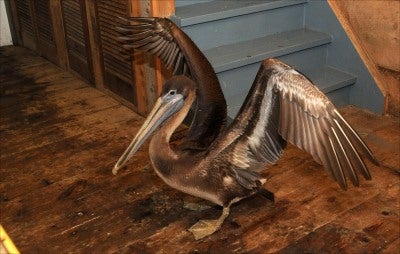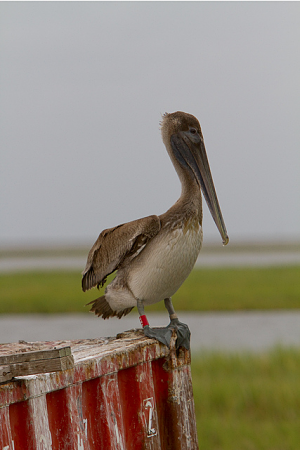
La página que intenta visitar sólo está disponible en inglés. ¡Disculpa!
The page you are about to visit is currently only available in English. Sorry!


Ralph, a brown pelican, has spent six months in Canada. Photo: The Chronicle Herald/Mark Goudge
It wasn’t Ralph’s fault that he ended up at the strip club. The storm made him do it. Last September Hurricane Earl swept a young brown pelican to Nova Scotia, where he landed at Ralph’s Club, a strip joint that he was subsequently named for. Now, after months of Canadian hospitality, Ralph is heading home.
Ralph has spent half a year at the Hope for Wildlife Society rehabilitation center, where Hope Swinemar has been caring for him. He hasn’t been sent home sooner because of red tape.
He can’t be flown across the border on a commercial plane unless he’s been cleared in advance for entry into the U.S., staff member Allison Dube told The Chronicle Herald. “There is no local U.S. Fish and Wildlife office in Halifax to do that.”
Instead the group was hoping someone might offer the pelican a spot on a private plane. But Halifax businessman Garry Soweby had a different idea: Drive the bird in an eco-friendly van.
"That’s a lot of money for anybody and that’s a big carbon footprint to get a little bird down south," he told The Chronicle Herald. "I thought, ‘Gee, if we could do it with an ethanol-powered vehicle, it would be almost the same as him flying down there himself, in terms of the carbon footprint.’ "
The distance of the 1,200-mile drive to a North Carolina wildlife sanctuary doesn’t ruffle Soweby, who has driven around the world and holds several long-distance driving records, according to CBCNews Canada. But having a pelican passenger might make for a rather stinky adventure, he says. "It’ll be a bit of a smelly drive, but I think I can deal with that. He’s eating fish all day and he’s gotta let it out somewhere."
Swinemar, who runs the Hope for Wildlife Society, will also come along. They plan to leave March 7. Ralph will ride in a cage, stocked with plenty of food and water. Once they drop him off, he’ll spend the winter with two other brown pelicans at the rehabilitation center before being released in the spring, CBCNews Canada reports.
While it’s shaping up to be a happy ending for Ralph, his feathered brethren still face numerous threats—increasingly frequent and intense storms as the globe warms being just one of them. Brown pelicans—which just came off the Endangered Species List in November 2009—were the avian species hit hardest by the disastrous BP oil spill, second only to laughing gulls.
Though the oil spill has largely faded from the news, there is still much recovery work to be done. You can help by contacting your senators and asking them to designate Clean Water Act penalties—paid for by BP—for Gulf recovery and restoration that will help birds, wildlife, and habitat in the region.
You don’t have to be a long-distance driver to help pelicans. Click here to send a letter.
 Red banded juvenile Brown Pelican 4Z2, oiled by BP Deepwater Horizon oil disaster, rehabilitated and released on Rabbit Island, West Cove, Louisiana. Photo: Kim Hubbard/Audubon magazine |